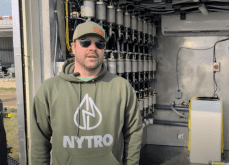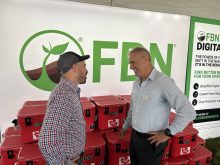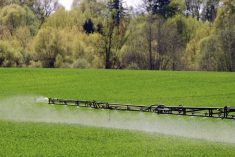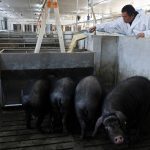Warning they don’t have time to wait on negotiation, representatives for cattle feeders, fertilizer producers and grain growers took to Parliament Hill on Monday to press for the federal government to instead legislate Canadian Pacific Railway’s engineers and conductors back to work.
Traffic halted on CP lines just after midnight ET Sunday morning as the company fulfilled its lockout notice on about 3,000 workers. The company said it had been served with strike notice from the workers’ union which was due to take effect at the same day and time.
Read Also

U.S. grains: Chicago grain prices fall amid profit-taking and dollar rebound
Chicago | Reuters – Chicago corn, soybean and wheat futures fell on Friday, pressured by profit-taking and a rebound in…
Negotiators for CP and for the Teamsters Canada Rail Conference, which represents the workers, “remain at the table,” federal Labour Minister Seamus O’Regan said on Twitter Monday. “We have faith in their ability to reach an agreement. Canadians expect them to do that ASAP.”
O’Regan added he would remain “here in Calgary until they do.”
A negotiated settlement, however, can’t come fast enough for representatives of the Canadian Cattlemen’s Association, National Cattle Feeders Association, Grain Growers of Canada and Fertilizer Canada, who on Monday afternoon in Ottawa called for back-to-work legislation.
Groups have been pressing for the company and union to reach a deal, CCA president Bob Lowe said at Monday’s press conference, but with the work stoppage now underway they “have to ask the federal government to intervene and implement back-to-work legislation immediately.”
The drought-dented Prairie harvest of 2021 has left cattle producers and cattle feeders across the region dependent on feed corn railed in from the U.S. via CP, whose lines provide the most direct connections between U.S. railways in the Plains states and the cattle-feeding regions of southern Alberta.
“We already have experienced the significant impact disruptions in rail can have on our producers, as this January due to (the omicron variant of COVID-19) and cold weather, trains were delayed and this resulted in severe feed shortages and some cattle producers coming within hours of running out of feed,” Lowe said Monday.
Trains have been running these past several weeks, he said, but producers “have not been able to build a stockpile of feed and currently we only have a one- to two-week buffer of feed in the system before we won’t have any feed for our cattle.”
To put the region’s feed corn needs in perspective, NCFA chair James Bekkering said CP in 2021 alone imported 8,100 cars of corn, he said, up from just 600 in 2020. So far in 2022, he said, the industry has already exceeded that 2021 figure — and consistent transport of feed has “already been compromised for months.”
Cattle require a consistent ration, he said, so feed types can’t be quickly swapped out based on whatever’s most available. Any changes that are made involve working closely with livestock nutritionists to introduce new feeds at a rate that won’t impact animal health. “Cattle cannot simply eat something new each week.”
Trucking U.S. corn into the region is also not an option, Lowe reiterated, noting previous estimates that over 1,000 Super B trucks would be needed each week to replace the volume coming in on CP track — and that level of truck capacity is unavailable.
From grain growers’ perspective, “cash flow is king,” Grain Growers of Canada executive director Erin Gowriluk said at the press conference. The railways represent “the only way to bring what little remains of last year’s grain to market and support what we hope will be a bounce-back season for Canadian crops… For every week that we’re offline, it will take a month to recover from that backlog.”
Also, she said, given the war in Ukraine frustrating grain traffic out of the Black Sea region, Canada’s international customers “require quick reassurance that a spring crop will go in the ground without delays caused by supply chain interruptions.”
‘Already behind’
Fertilizer Canada, which represents fertilizer manufacturers and distributors, “respects the collective bargaining process, but we feel we have now reached the point where the government must intervene,” that group’s executive vice-president Clyde Graham said Monday.
Seeding “four to six weeks away” in Canada depending on the region and sooner in parts of the U.S. to which Fertilizer Canada members export, he said.
“Due to poor rail service leading into the spring season, Fertilizer Canada members are two to three weeks already behind on inventories and storage capacity at fertilizer production facilities,” he said.
There’s a “brief window,” he said, where farmers fertilize crops and are counting on timely supplies to make up last year’s losses.
Seventy-five per cent of fertilizer products are shipped by rail, he said, leaving the group’s member companies “days away from curtailing production and shutting down facilities.”
When asked about hesitancy among politicians across the House to call directly for back-to-work legislation, Graham said “I’m hopeful that equivocation is an attempt to respect the collective bargaining process, and that when the time comes — which is now — to implement back-to-work legislation, the politicians and senators in Parliament will act quickly and decisively.”
Nova Scotia Liberal MP Kody Blois, the current chair of the Commons’ agriculture committee, said at the same press conference that while it was important for the ag sector’s concerns to be aired, he’s “quite confident that members of Parliament across the House understand the implications and how impactful this is, and how problematic it is.”
MPs, he said, “certainly want to be mindful of protecting the collective bargaining process, but at the same time there is a collective interest here, vis-a-vis the fact that we’ve just gone through COVID” with its supply chain impacts, followed by the rise of war in Ukraine “creating a whole new dynamic.”
Canada, “in my view, and I believe in others’ view as well, has a responsibility to be there, not only for our own food security but for global food security.”
Beyond Monday’s press conference, other farm and agrifood sector groups also weighed in Monday with calls for a quick end to the CP stoppage, via legislation or otherwise.
“Farmers have a limited growing season and any disruption to transportation of important inputs will mean we don’t get the seed in the ground with the nutrients that the seed needs to grow and ultimately we will lose out on production,” Grain Farmers of Ontario chair Brendan Byrne said in a separate release.
“Lower production on the farm means less food in the system here at home and less to help those worldwide that will desperately need our help.”
The Western Canadian Wheat Growers, in a separate release, said it held the Teamsters accountable for the stoppage and also called for immediate back-to-work legislation.
The Canadian Oilseed Processors Association, meanwhile, said its members “will be forced to curb production and unfortunately experience preventions and delays in executing customer contracts” due to the CP stoppage. — Glacier FarmMedia Network
















